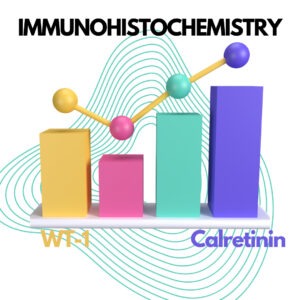Key takeaways: Immunohistochemistry (IHC) utilizes lab-grown antibodies (which programmed target “antigens” as the biological indicators of mesothelioma) as a way of diagnosing mesothelioma. These biological indicators are called “positive mesothelioma markers,” and need to have both high sensitivity and specificity. Currently, there isn’t a set panel of positive markers for scientists conducting IHC; ideally, this system will become more standardized.

What is Immunohistochemistry (IHC)?
IHC is a type of immunostaining: a visualization technique using antibodies and colorful enzymes. In IHC, lab-reared antibodies have enzymes attached to them. If the antigen—in this case, biomarkers of mesothelioma—is detected, then the enzyme undergoes a reaction. This reaction facilitates a kind of “staining” under the microscope, so the stain is used as a proxy for diagnosing mesothelioma.
Previously, because scientists didn’t know of the biomarkers of mesothelioma—the molecules that are indicative of abnormal growth, cell signals, or cancer metastasis—IHC wasn’t a useful
diagnostic tool. But now, because research established that there are molecules that qualify the presence of mesothelioma (over another, similarly presenting disease), IHC is exceptionally
useful. For instance, if IHC isn’t conducted on a biopsy specimen, then the patient risks being misdiagnosed with a more common disease, like lung cancer or pneumonia. Recent studies have also explored the heterogeneity of mesothelioma, or the tendency for mesothelioma to look and act differently in different pockets of the same tumor. With IHC-based diagnosis, there’s a smaller error margin in diagnosis, especially when scientists are able to create a panel of positive mesothelioma markers. A positive mesothelioma marker is a molecule that is usually—if not always—present in a mesothelioma patient; common examples of positive mesothelioma markers include WT-1 protein, cytokeratin 5/6, and calretinin. Ideally, these markers can withstand the test of heterogeneity: despite where in the tumor the biopsy is collected, IHC testing should yield similar diagnostic results. Positive mesothelioma markers are tested for sensitivity—how many molecules are present—and specificity—whether the “staining” reaction occurred because of the presence of the target antigen or a different reason. Researchers are trying to establish both high sensitivity and specificity for plausible mesothelioma markers. On the other hand, there are certain negative markers that disqualify a mesothelioma diagnosis, and instead lend themselves to a carcinoma or sarcoma-based cancer. Establishing both positive and negative mesothelioma markers is paramount for ensuring a correct diagnosis.
Recent Studies on Diagnosing Mesothelioma with IHC
A 2020 study investigated IHC results and prognosis of the patient. The researchers found that IHC results could inform treatment options for the patient; for example, the presence of PD-L1
might affect how responsive a patient is to immunotherapy. As more research is conducted, there will likely be more of these “treatment-informative” molecules that are established—for now,
though, research is limited.
A more recent study (2024) conducted an analytical review on existing IHC literature in order to unify the IHC process. There isn’t a standard for ensuring a mesothelioma diagnosis, meaning
that labs conducting IHC don’t have a bona fide reference point. This study sought to streamline the markers and their respective meanings—high GLUT1 for sarcomatoid mesothelioma, EMA
for epithelioid mesothelioma, etc. This review study is the first of its kind to assemble the biomarkers and their correlates.
If you or a loved one has been diagnosed with mesothelioma, please call The Halpern Law Firm at 1 (800)-505-6000. We are here to help you navigate the legal process of filing a claim to receive compensation for your cancer diagnosis. We help mesothelioma victims and their families in Pennsylvania.
Sources:
https://my.clevelandclinic.org/health/diagnostics/25090-immunohistochemistry
https://www.sciencedirect.com/science/article/abs/pii/S0344033824001870